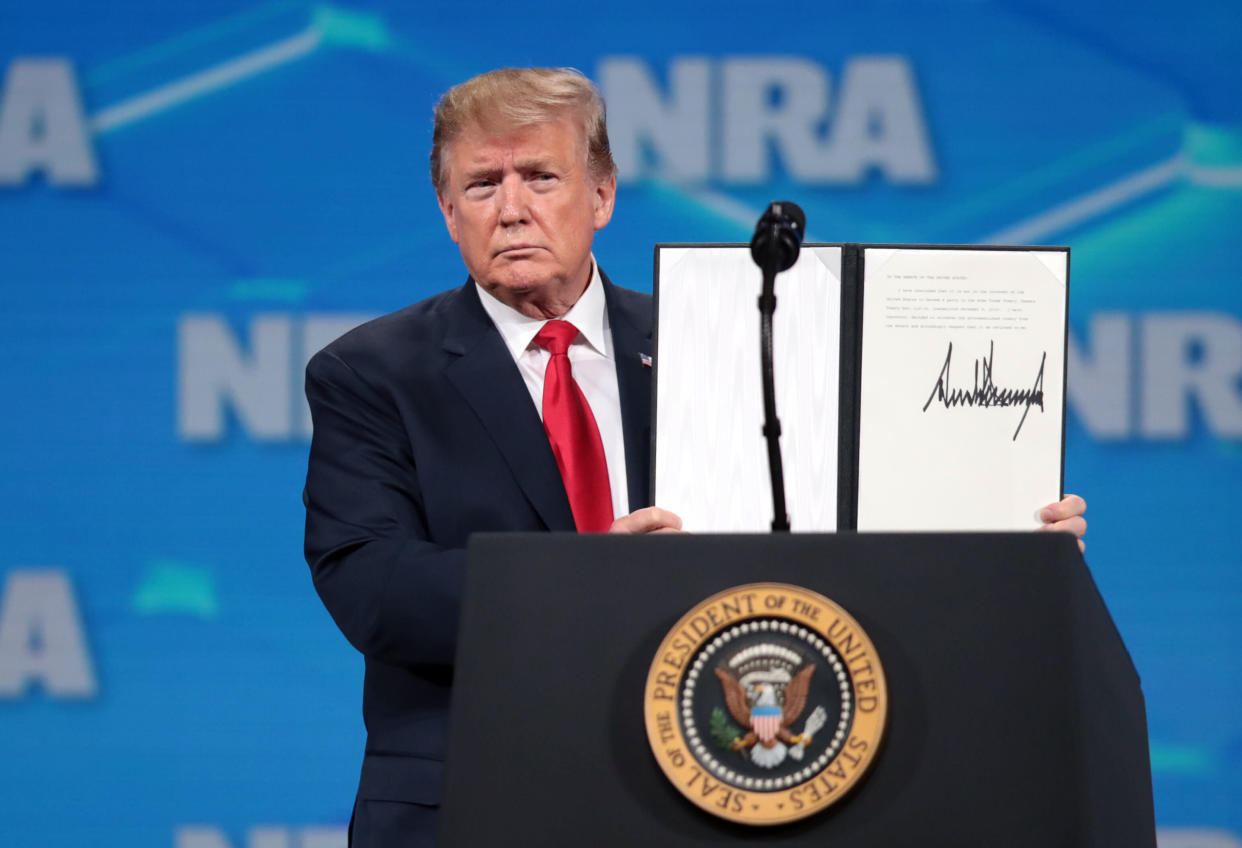Trump pulls out of arms control treaty opposed by NRA

President Trump chose the backdrop of the National Rifle Association’s leadership forum to announce his latest blow to multilateral institutions. In a speech to the pro-gun group in Indianapolis, President Trump announced he would pull the United States out of the Arms Trade Treaty, an agreement intended to strengthen rules on the global weapons trade.
While the move upset backers of the agreement, Trump’s decision might have little impact beyond thrilling the NRA.
Rachel Stohl, managing director of the Stimson Center and a consultant to the UN Arms Trade Treaty process, dismissed Trump’s withdrawal from the treaty as stagecraft designed to please his allies in the gun lobby.
“It was very theatrical. This was a well-choreographed pandering to special interest groups,” she said.
The NRA has long opposed the treaty, which was approved by the United Nations General Assembly in April 2013. Trump’s predecessor, President Barack Obama, signed it soon after, but the treaty was never ratified by the U.S. Senate.
On stage before the NRA, Trump dramatically signed a letter calling for the Senate to end the ratification process before tossing the pen to the cheering crowd.
“We will never allow foreign bureaucrats to trample on your Second Amendment freedom,” Trump said of the treaty, which the United States helped negotiate.
The treaty was designed to encourage other countries to adopt stronger arms control measures, and has no impact on domestic gun laws. And while the NRA has cast it as an effort to curb gun rights, the United States already has tighter arms transfers than many other countries and the treaty would not call for changes to the current U.S. system.
Stohl suggested the NRA’s motives in opposing it were purely political.
“The only sort of discussion around it has been by the NRA and other gun groups who have opposed the treaty, not based on any substantive opposition, but through mischaracterization of what this treaty is, and who see it as a tool for fundraising and political access,” she said.
However, the White House echoed the NRA’s line that the treaty posed a threat to American gun rights. In a conference call with reporters on Friday afternoon, a senior Trump administration official acknowledged the U.S. already has tighter curbs on arms transfers than much of the rest of the world, but said the treaty could “expose the Second Amendment rights of the American people to risk.”
The official cited the possibility amendments could be added to the agreement, though they declined to name any specific proposals they were concerned about.
According to Stohl, the concerns over amendments are a red herring. “If you read the treaty text, the amendments are only binding on states that ratified those amendments,” she said. “You cannot be bound by future amendments.”
The Arms Control Association, which advocates for stronger protections on weapons, released a series of statements describing Trump’s move as a boon to other countries with more unregulated arms markets. The group noted America was joining Iran, Syria and North Korea in opposing the adoption of the treaty.
“The treaty text explicitly says that each country is responsible for implementing the treaty in accordance with its own constitutional law,” Arms Control Association Executive Director Daryl Kimball said. “The United States already has the most detailed legislation that govern the substance and process of U.S. arms sales.”
Sharon Weinberger contributed to this article.
_____
Read more from Yahoo News:


